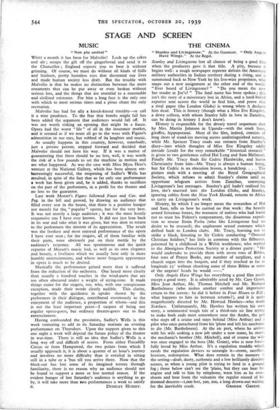THE CINEMA
"Stanley and Livingstone." At the Gaumont. "Only Angels liave Wings." At the Regal.
Stanley and Livingstone lost all chance of being a good film when the producers gave it that title. A pity, because it begins well: a tough newspaper reporter defeats the American
military authorities in Indian territory during a rising, and is summoned back to New York by his live-wire proprietor, who
snaps out a new assignment at the other end of the world.
"Ever heard of Livingstone?" "Do you mean the new bar tender at Joe's? " The fatal name has been spoken ; this
isn't the story of a missionary lost in Africa, and a hard-boiled reporter sent across the world to find him, and prove that a rival paper (the London Globe) is wrong when it declares him dead. This is history (though what a Miss Eve Kingsley, a dewy colleen, with whom Stanley falls in love in Zanzibar, can be doing in history I don't know).
History is responsible for the dreary travel sequences shot by Mrs. Martin Johnson in Uganda—with the stock lions, giraffes, hippopotami. Most of the film, indeed, consists of long shots of stand-ins moving across undistinguished scenery, while Mr. Spencer Tracy reads out extracts from Stanley's diary—into which thoughts of Miss Eve Kingsley oddly intrude (credit for the very remarkable "historical research" is given to two gentlemen called Hal Long and Sam Hellman).
Finally Mr. Tracy finds Sir Cedric Hardwicke, and learns Christianity from him—Mr. Tracy is always a human being, but Sir Cedric is an elocution lesson, a handclasp. . . . The picture ends with a meeting of the Royal Geographical Society, which refuses to admit Stanley's claims until an opportune telegram arrives from Zanzibar, conveying Livingstone's last messages. Stanley's girl hadn't realised his love, she's married into the London Globe, and Stanley, ignoring cables from the New York Herald, returns to Africa to carry on Livingstone's work.
History, by which I no longer mean the researches of Hal and Sam, tells us how he carried on that work : the heavily armed ferocious forays, the massacre of natives who had learnt not to trust his aihrer's temperament, the disastrous expedi- tion to rescue Emin Pasha (who like Livingstone had no desire to be rescued), the unpleasant sexual rumours which
drifted back to London clubs. Mr. Tracy, learning not to strike a black, listening to Sir Cedric conducting "Onward
Christian Soldiers," has little in common with the filibuster, poisoned by a childhood in a Welsh workhouse, who replied to the Aborigines Protection Society at a dinner party : "He
would undertake to provide them with seven tons of Bibles, four tons of Prayer Books, any number of surplices, and a church organ into the bargain, and if they reached as far as longitude 23° without chucking some of those Bibles at some of the negroes' heads he would —."
Only Angels Have Wings has everything a good film needs except a good story. It is admirably acted by Mr. Cary Grant, Miss Jean Arthur, Mr. Thomas Mitchell and Mr. Richard Barthehness (who makes another sombre and impressive leturn to the screen : he did it before in Four Hours to Kill ; what happens to him in between returns?), and it is quite
magnificently directed by Mr. Howard Hawkes—who made Scarface. Unfortunately, Mr. Hawkes has written his own
story, a sentimental tough tale of a third-rate air line trying
to make both ends meet somewhere near the Andes, the girl who steps off a cruise and stays behind (Miss Arthur) and a
pilot who once parachuted from his 'plane and left his mechanic
to die (Mr. Barthelmess). At the air port, where he arrive, with his wife seeking a new job under a new name, he meets the mechanic's brother (Mr. Mitchell), and of course the wile was once engaged to the boss (Mr. Grant), who is now force- fully loved by Miss Arthur. It's a regulation muddle which needs the regulation devices to untangle it—storm, sacrifice, heroism, redemption. What does remain in the memory the setting—drab, setting—drab, dusty, authentic and a few brilliantly directec scenes, as when a young pilot is trying to land in a groun fog ; those below can't see the 'plane, but they can hear hi' engine and talk to him by telephone, warn him as he over- shoots and hear from the vulcanite the regular record of hi, doomed descent—i,000 feet, 500, 200, a long drawn-out waiting












































 Previous page
Previous page